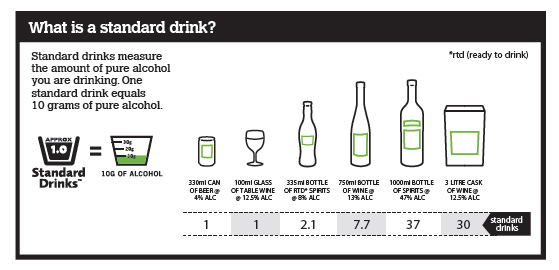

It's not the amount of liquid you are drinking that's important – it's the amount of alcohol it contains.
The standard drinks measure is a simple way for you to work out how much alcohol you are drinking. It reflects the amount of pure alcohol in a drink. One standard drink equals 10 grams of pure alcohol (approximately 2 teaspoons).
It's not the amount of liquid you are drinking that's important – it's the amount of alcohol it contains. As different types of alcoholic drinks have different amounts of alcohol in them, the number of standard drinks in each can, bottle or cask, will also vary. You'll find the standard drink content on the label, container or packaging of each drink.
It takes at least 1 hour – and sometimes much longer – to remove 1 standard drink from our bodies. Women absorb and metabolise alcohol differently than men. They have higher blood alcohol concentration (BAC) after consuming the same amount of alcohol as men, and are more at risk of alcoholic liver disease, heart muscle damage, and brain damage.1,2
Drinking alcohol has both immediate and long-term health effects. Because people are different – there is no amount of alcohol that can be said to be safe for everyone. Low-risk drinking guidelines reflect the harms that might arise from single drinking occasions (where there is a risk of injury to self or others) and from the long-term health consequences of regular drinking (such as increased risk of cancer, cardiovascular disease, diabetes, liver disease and addiction problems).
Current long-term drinking guidelines give advice on how to lower your risk.3
Not drinking is the safest option for young people under 18 years of age. Guidelines advise:
Guidelines advise:

Check out KidsHealth's page on alcohol facts for more information [3]
Check out KidsHealth's page on alcohol and young people for more information [4]
1. Urbano-Márquez, A.; Estruch, R.; Fernández-Solá, J.; Nicolás, J.M.; Paré, J.C.; & Rubin, E. The greater risk of alcoholic cardiomyopathy and myopathy in women compared with men. JAMA 274(2):149-154, 1995
2. Nixon, S.J. Cognitive deficits in alcoholic women. Alcohol Health & Research World 18(3):228-232, 1994
3. ALAC website - Low risk drinking advice [6]

The Paediatric Society of New Zealand and Starship Foundation are very grateful to Northland District Health Board (NDHB) for permission to reproduce this content from the Whānau pack: Tools for families and parents with teenagers [7].
Copyright
NDHB own the copyright in this material and it must not be copied or reproduced except as expressly permitted by NDHB.
This page last reviewed 13 March 2024.
Email us [21] your feedback
Links
[1] https://resources.alcohol.org.nz/assets/Uploads/Publications/4.0-AL-437-Guide-to-Standard-Drinks_web.pdf
[2] http://www.alcohol.org.nz/help-advice/standard-drinks/whats-a-standard-drink
[3] https://kidshealth.org.nz/parenting-teens-alcohol-facts
[4] https://kidshealth.org.nz/parenting-teens-alcohol-young-people
[5] https://kidshealth.org.nz/tags/parenting-teens
[6] https://www.alcohol.org.nz/help-and-support/advice/standard-drinks-and-legal-limits/#e383
[7] https://www.northlanddhb.org.nz/your-health/health-resources/whanau-pack/
[8] https://kidshealth.org.nz/node/1836?language=zh-hant
[9] http://brainwave.org.nz/article/alcohol-other-drug-use-in-adolescence-a-quick-snapshot/
[10] https://kidshealth.org.nz/node/1942?language=zh-hant
[11] https://wharaurau.org.nz/sites/default/files/Projects/CEP-AOD-Opt/Tools-for-CEP/Resources/PDF/Alcohol-and-Drug-Disorders-Families-Info-Sheet.pdf
[12] https://kidshealth.org.nz/node/2442?language=zh-hant
[13] https://kidshealth.org.nz/node/2482?language=zh-hant
[14] https://drugfoundation.org.nz/topics/whanau-and-young-people/did-you-know
[15] https://drugfoundation.org.nz/topics/whanau-and-young-people/did-you-know/alcohol
[16] https://drugfoundation.org.nz/topics/whanau-and-young-people/did-you-know/cannabis
[17] https://drugfoundation.org.nz/topics/whanau-and-young-people/did-you-know/meth
[18] https://drugfoundation.org.nz/topics/whanau-and-young-people/did-you-know/synthetics
[19] https://drugfoundation.org.nz/topics/whanau-and-young-people/did-you-know/volatile-substances
[20] https://drugfoundation.org.nz/topics/whanau-and-young-people/did-you-know/conversation-planner
[21] https://kidshealth.org.nz/contact?from=http%3A%2F%2Fkidshealth.org.nz%2Fprint%2F1845%3Flanguage%3Dzh-hant